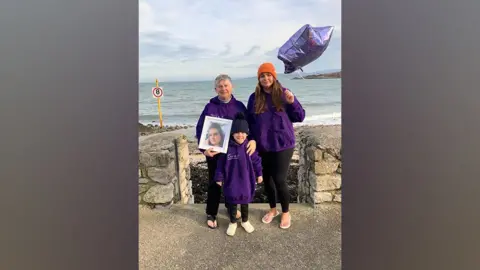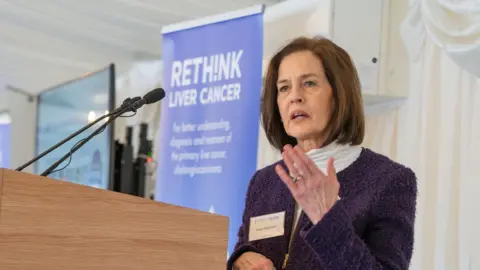'Mum's death days after cancer news not uncommon'
 AMFF
AMFFA mother of three who died days after receiving a liver cancer diagnosis is a tragically common case, a charity has said.
Sian Ashcroft died last year aged 35 just 18 days after she was diagnosed with cholangiocarcinoma (CCA), a form of liver cancer.
Also known as bile duct cancer, CCA has a "dismal" five-year survival rate of between 2-9% compared to the England average for all cancers which is 54%, CCA charity AMMF said.
The charity said this was because patients were often diagnosed at a late stage and medical teams were unaware of the treatments available, with more than 50% of CCA patients receiving no cancer-specific treatment at all.
The Royal College of General Practitioners said that diagnosing some cancers in primary care could be incredibly challenging but that the proportion of cancers diagnosed after referral by a GP had increased in latest figures.
The Department of Health and Social Care has been contacted for comment.
Ms Ashcroft, from Ormskirk, first started to realise that something was wrong with her health when she tried to donate blood in the spring of 2023 and was told she was anaemic, her family said.
She began taking iron tablets to address her anaemia but, by the August, she started to experience abdominal pain, which she initially put down to food poisoning.
'An incredible shock'
When the pain continued, her GP referred her for hospital tests. At first, she was told she probably had gallstones but, as the pain worsened, she was admitted to hospital for surgery to insert a stent in her bile duct.
In early November 2023, at a follow-up appointment, Sian was told that she had a 2cm (0.79in) lesion on her liver and several smaller lesions that were concerning. Although chemotherapy was discussed, Ms Ashcroft did not receive a CCA diagnosis for another two months.
In January 2024, she was diagnosed with terminal cholangiocarcinoma at Aintree University Hospital and told she had months to live. She died 18 days later.
 AMFF
AMFF"Sian's prognosis was an incredible shock for everyone," her mum, Sue Dowling said.
"She had become increasingly poorly, with frequent visits to her GP and time spent in hospital, but her diagnosis came too late to save her.
"Despite this, she remained incredibly positive, she never lost her sense of humour, she was exceptionally brave and, above all, she never stopped thinking about her family."
AMMF chief executive, Helen Morement, said Ms Ashcroft's story was, "tragically", not uncommon.
She said the majority of CCA diagnoses were late-stage and only about 21% were diagnosed at stage one or two, which was well below the proportion for all cancers generally (54%).
"Often, patients don't fit the profile of what many assume a liver cancer patient should look like," Ms Morement said.
"Unlike the other more well-known type of primary liver cancer – Hepatocellular carcinoma (HCC) - there isn't an established link to liver cirrhosis, viral hepatitis, alcohol or other lifestyle factors."
 AMMF
AMMFNew evidence suggests cases are rising significantly, the charity says. Figures published by the NHS recorded the number of cases of CCA in 2020 in England as 2,706, almost the same as HCC (2,792).
The charity said this should be a significant cause for concern, given that the prognosis for CCA is "currently so dismal".
There are a number of treatments that can help to control symptoms and delay progression of the cancer, however more than 50% of CCA patients are not given any cancer-specific treatment at all, according to research commissioned by AMMF.
"People are dying because there is a lack of knowledge of what is available," Ms Morement said.
"If they are diagnosed somewhere where they do not have a lot of experience the patient needs to be referred to someone who is an expert because time is of the essence."
'Rethink'
On Thursday, as part of World Cholangiocarcinoma Day, Liverpool's Royal Liver Building is set to turn purple to raise awareness for AMMF's Rethink Liver Cancer campaign and in memory of Sian Ashcroft
As part of the campaign, the charity is calling on clinicians, health planners and policy makers to "rethink" the disease, to help ensure that people with CCA receive the best possible chance of improving the health outcomes.
"If someone comes to a doctor with these unusual symptoms and they're not clearing up they should run a liver test, which will pick up if there is something wrong," Ms Morement said.
"We really need to get earlier diagnoses and to do that we need GPs to be more aware."
The Royal College of General Practitioners said "due to the intense workload and workforce pressures on our service", GPs often lacked the time with patients to have the conversations needed to consider less likely diagnoses.
"The government urgently needs to invest in primary care and support our workforce with recruitment and retention initiatives," Professor Kamila Hawthorne, chair of the Royal College of GPs, said.
"Diagnosing some cancers in primary care can be incredibly challenging as early symptoms may often be vague or indicative of more common and less serious conditions - and some cancers, such as this one, may not present clinically until they are already at quite a late stage.
"However, the proportion of cancers diagnosed after referral by a GP increased to 60% by 2020, according to latest figures."
Listen to the best of BBC Radio Merseyside on BBC Sounds and follow BBC Merseyside on Facebook, X and Instagram and watch BBC North West Tonight on BBC iPlayer.
